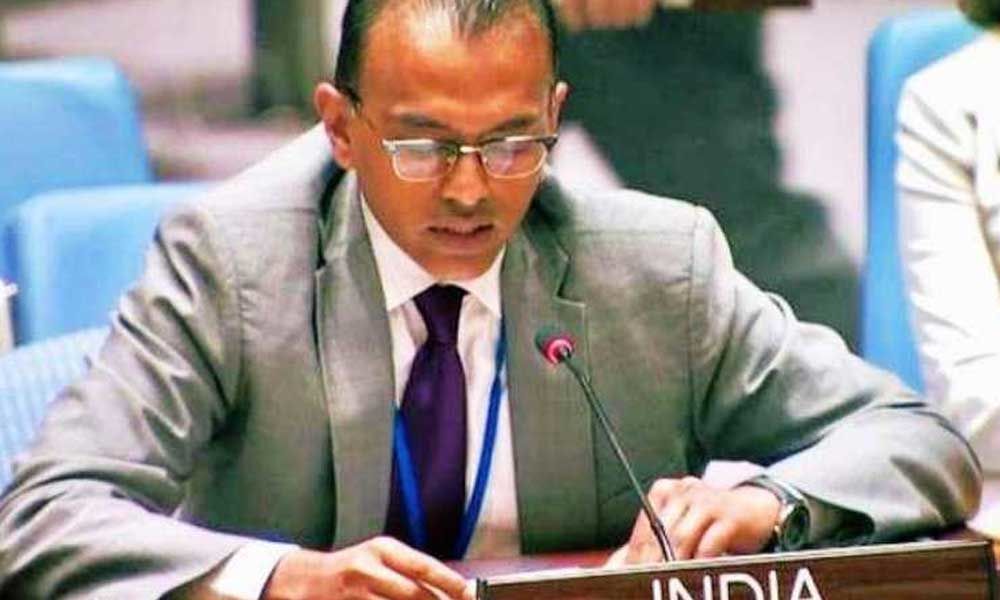Live
- Telangana High Court Issues Key Directions on KTR’s Lunch Motion Petition
- Hussain Sagar to Get 10-Km Skywalk with Cycling and Walking Paths
- Vizagites gripped in ‘Namo' mania
- Shashtipoorthi Shows Us the Solution for Long-lasting Happiness: Rajendra Prasad
- Cinema is My Lifelong Passion: Viwswambhara Director Vassishta on His Birthday
- Allu Arjun's Jail Exit: Telangana DG Addresses Controversy
- Three Youths Drown Near Kulai Jetty in Mangaluru
- Sankranti Movie Premieres: Kalki 2898 AD, Mathu Vadalara 2, Committee Kurrollu & More
- Students of Annamacharya University Organize a Massive Anti-Drugs Rally
- Decision of the Constitution Bench on Unilateral appointment of arbitrator: Impact on the financial sector arbitration
Just In

The UN owes India USD 38 million, among the highest it has to pay to any country, for peacekeeping operations as of March 2019.
UNITED NATIONS: India, which is owed USD 38 million by the United Nations for peacekeeping operations, has called for a comprehensive solution to address the "real" financial crisis facing the world body, saying countries that owe arrears are "insured" from the impact of their inaction.
The UN's peacekeeping financial year is ending on June 30 and member states are yet to pay USD 1.9 billion worth of assessments for peacekeeping budget and USD 1.5 billion worth of assessments for the Regular Budget, India's Deputy Permanent Representative to the UN Ambassador K Nagaraj Naidu said at a session on 'Improving the Financial Situation of the United Nations.'
Naidu said many Troop Contributing Countries (TCCs), including India, are awaiting for "long, legitimate reimbursements" from the closed peacekeeping missions. "Our expectation is that the problem be discussed and addressed comprehensively," he said.
The UN owes India USD 38 million, among the highest it has to pay to any country, for peacekeeping operations as of March 2019, UN Secretary General Antonio Guterres had said in his report on improving the financial situation of the UN released in April. Naidu said that the UN Secretariat briefed the member states earlier this month of the large amounts of reimbursements that were due to the Troop Contributing Countries.
These include troops cost with USD 339 million and Contingent Owned Equipment claims from the active and closed missions worth USD 670 million. "Yet there is reluctance in some quarters to recognise the financial problems being faced by the UN," he said adding that the "crisis is real and present and we need a solution that works."
Naidu voiced concern over the practice of meeting the cash requirement of active missions by dipping into the cash pool of closed peacekeeping missions and delaying reimbursements to Police and Troop Contributing Countries, saying it has over a period of time created a false sense of financial soundness. "This approach of creative accounting in managing a financial crisis has never worked and never will. It appears that the countries that owe arrears are somewhat insured from the impact of their inaction," Naidu said.
"As a result, the arrears have grown larger and with it the expectations, of course from the arrear-owing countries that the Secretariat would somehow manage the status quo, even if it requires calibrating the reimbursement framework," he said.
He reiterated India's assertion that the practice of delaying payments to TCCs while other contractual obligations are met, impacts the UN's ability to maintain honest agreements with TCCs on other aspects of the peacekeeping.
While sufficient cash has been made available in the pool of closed peacekeeping mission accounts for reimbursing the Troop and Police Contributing Countries in accordance with the agreements signed with them, Naidu said this cash has been diverted to managing the liquidity crisis of the active peacekeeping missions and at times shortfall in the Regular Budget, thereby deferring resolution to the pressing problem.
He stressed that India believed a sustainable solution to the financial crisis would only emerge when member states begin to honour their budgetary obligations in full and on time. "If member-states do not meet their budgetary obligations, then at least in the context of future peacekeeping operations we see two emerging situations - one, where even with the available cash pool Troop Contributing Countries would not be reimbursed on time and two, missions will close with a cash deficit, without fully reimbursing the Troop and Police Contributing Countries," he said.
In a sign of how dire the financial situation of the UN is, Guterres said this week he had contemplated selling his official four-story residence in New York when he took charge as the world organisation's head to help resolve the deteriorating financial crisis facing the United Nations.
He had told the delegates at the Fifth Committee's meeting on 'Improving the Financial Situation of the Organization' that the first thing he did when he arrived in New York to assume charge as the UN Chief was to ask if he could sell the residence. "I am not joking. It is a true story. I discovered that I couldn't, because the residence can only be sold to the United States of America when we close the doors in New York. Obviously, it is not something that is not, hopefully, going to happen," he said.
The United Nations owed more than USD 250 million to troop- and police-contributing countries at the end of 2018 and again at the end of the first quarter of 2019. This debt is likely to again exceed USD 400 million at the end of June 2019, similar to the situation at the end of June 2018, Guterres said.

© 2024 Hyderabad Media House Limited/The Hans India. All rights reserved. Powered by hocalwire.com







